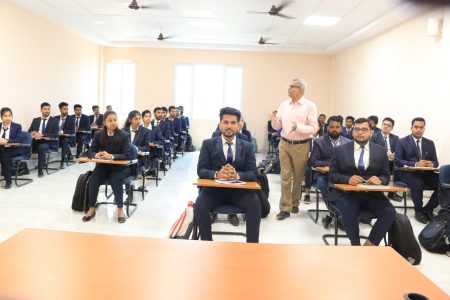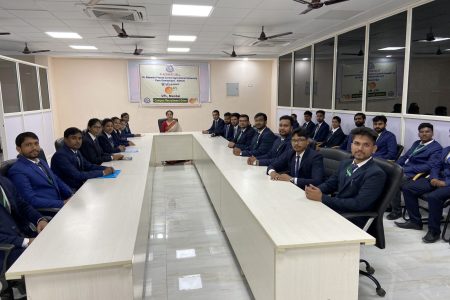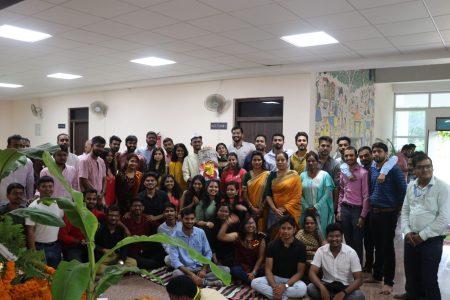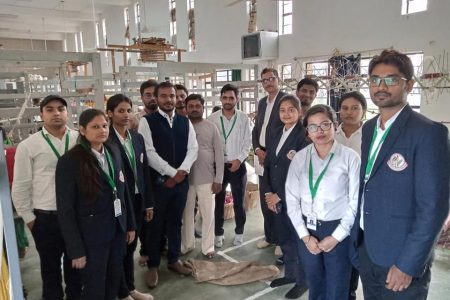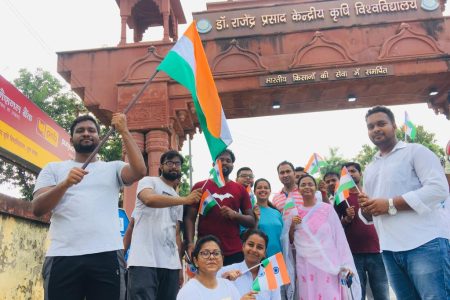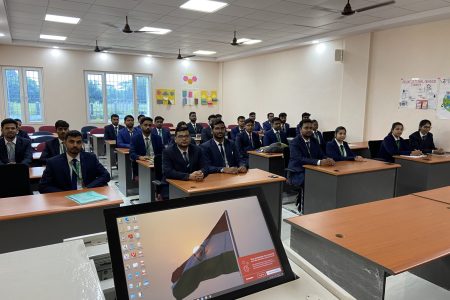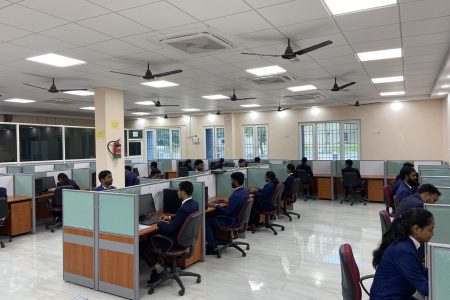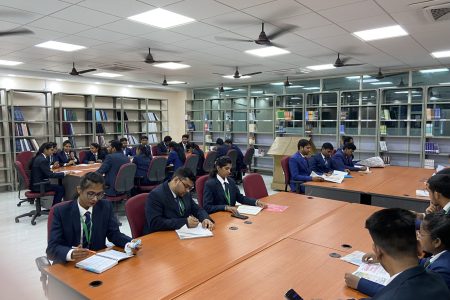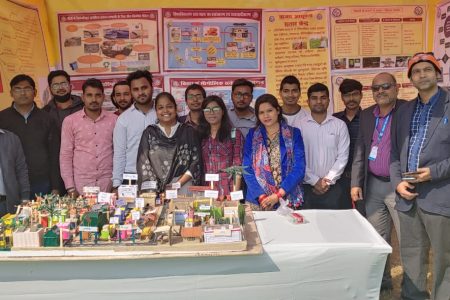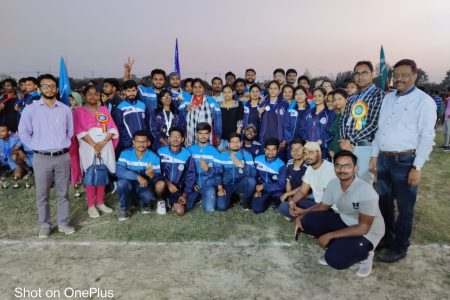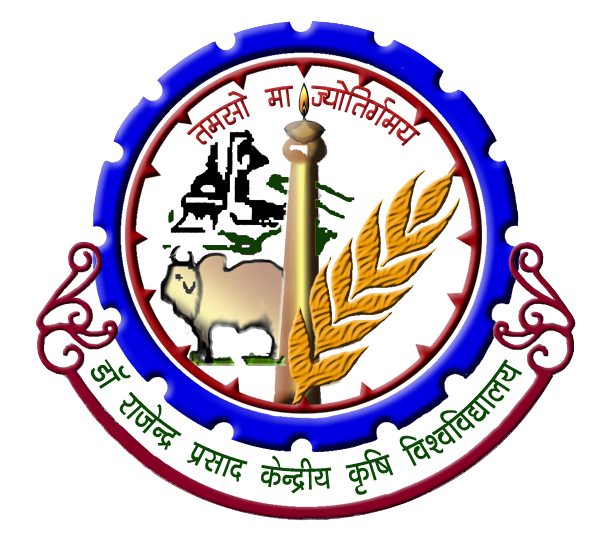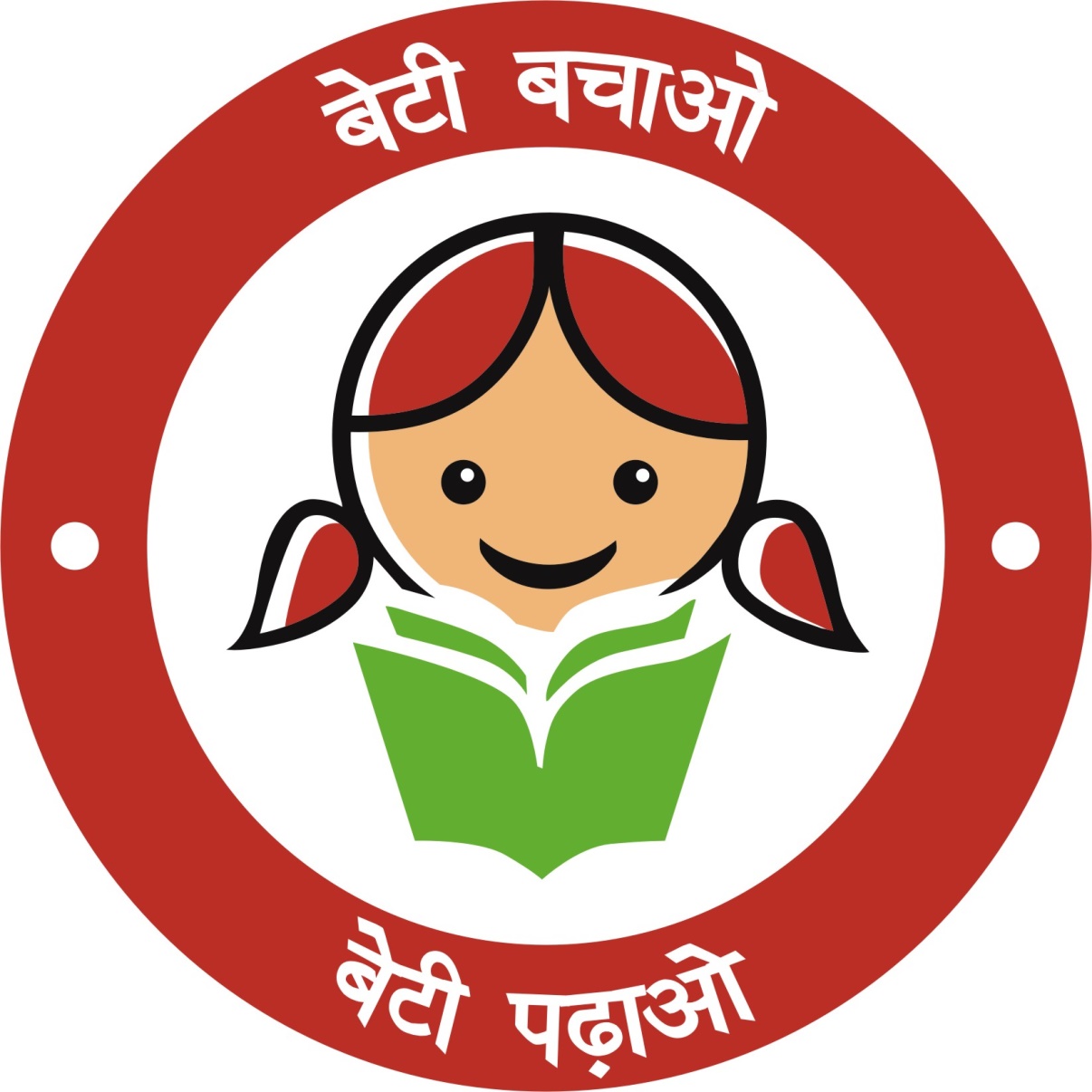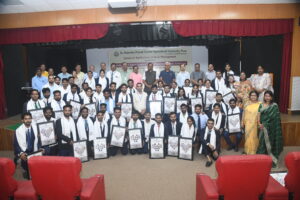School of Agribusiness & Rural Management

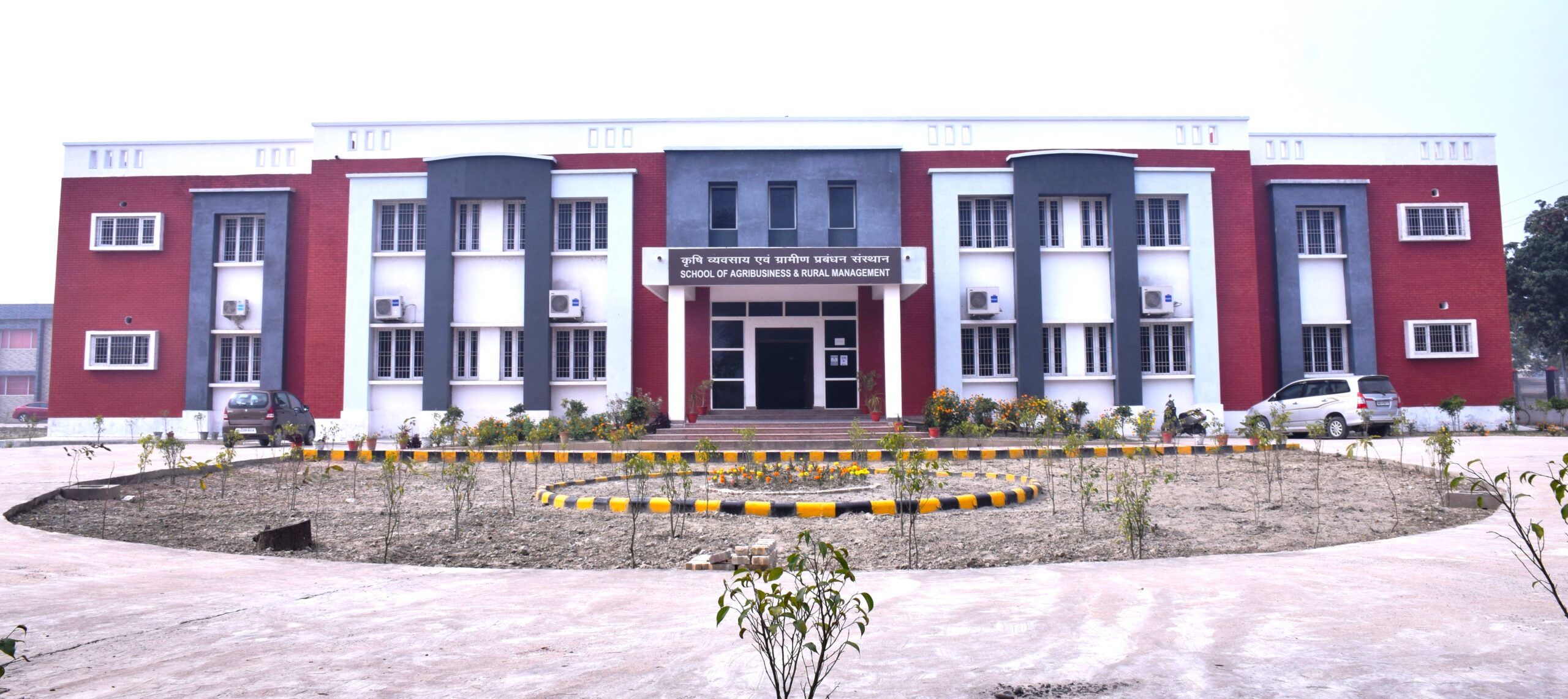
About SAB&RM
The University has launched MBA (Agribusiness) degree programme in 2006 under the Faculty of Basic Science and Humanities (FBS&H) and duly approved by the ICAR since 2010. Acknowledging the growing need for skilled professional in the field of rural management in the country, and limited availability of good quality institution in the eastern region, university has introduced MBA (Rural Management) programme during 2018 and clubbed with the MBA (Agribusiness) programme under School of Agribusiness and Rural Management (SAB&RM). The new building was inaugurated by Hon’ble Prime Minister of India Sri. Narendra Damodardas Modi Ji on 10th September 2020. The College is located within the premises of the University along with state-of-the-art infrastructure and all the necessary facilities for the professional development. This institute is among the premier management colleges not only in the state of Bihar but also expanding its features at national level. MBA Agribusiness program is ICAR accredited and follows the recently designed curriculum by BSMA committee. For MBA Rural Management program, in consultation with eminent stakeholders around the country new course curricula was implemented with major focus on industry relevant courses and experiential components. In accordance with the New National Educational Policy, the school has also introduced two one-year Post Graduate Diploma Programmes; Agri-Tourism Management, and Agriculture Journalism & Mass Communication.
Vision
To create an ethos of creativity & innovation for enhancing the quality of management in the agribusiness and rural sector for sustainable development of overall economy.
Mission
To bring rural prosperity that can help in improving the quality of rural life through effective management of agri-resources.
Objectives
- Creating professionally trained agri-business and rural managers with an appropriate ethos and values.
- Developing professional attitudes and problem-solving skill sets in the candidates to efficiently contribute for all the stakeholders involved in agribusiness and rural development sector.
- Encourage entrepreneurship among the students.
- Capacity building, institutional linkages and contributing to policy developments.
A glance on the Curriculum & Pedagogy
| MBA Agribusiness | MBA Rural Management | |||
|---|---|---|---|---|
| Semester 1: Core courses
Course work with field visits, case studies, practical assignments, role plays, group discussions, expert sessions from industry/academia | Semester 1: Core courses Course work with field visits, case studies, practical assignments, role plays, group discussions, expert sessions from industry/academia | |||
| Semester 2: Core courses with electives
Course work with field visits, case studies, practical assignments, role plays, group discussions, expert sessions from industry/academia | Semester 2: Core courses & KVK linkage component
2.1 Course work with field visits, case studies, practical assignments, role plays, group discussions 2.2 Student engagement with KVKs and report preparation on live project | |||
| Summer Internship (45 days) | ||||
| Semester 3: Core courses & electives
Course work with field visits, case studies, practical assignments, role plays, group discussions, expert sessions from industry/academia
| Semester 3: Core courses & electives
Attachment with NGO, development organization 3.1 Course work with field visits, case studies, practical assignments, role plays, group discussions, expert sessions from industry/academia 3.2 Student engagement with NGOs and report preparation on live project | |||
Semester 4: Student attachment with industry for project work Note: for Rural Management programme, there is blending phase while having project work (45 days) and certain courses in this semester. Project report preparation, external viva voce and report submission | ||||
Academic Programmes
| # | Programmes | Intake Capacity | Admission Process | ||
|---|---|---|---|---|---|
| 1 | Agribusiness | 50 |
| ||
| 2 | Rural Management | 30 |
| ||
| One-Year Post Graduate Diploma (PGD) | |||||
| 3 | Agricultural Journalism and Mass Communication | 25 |
| ||
| 4 | Agri Tourism Management | 25 | |||
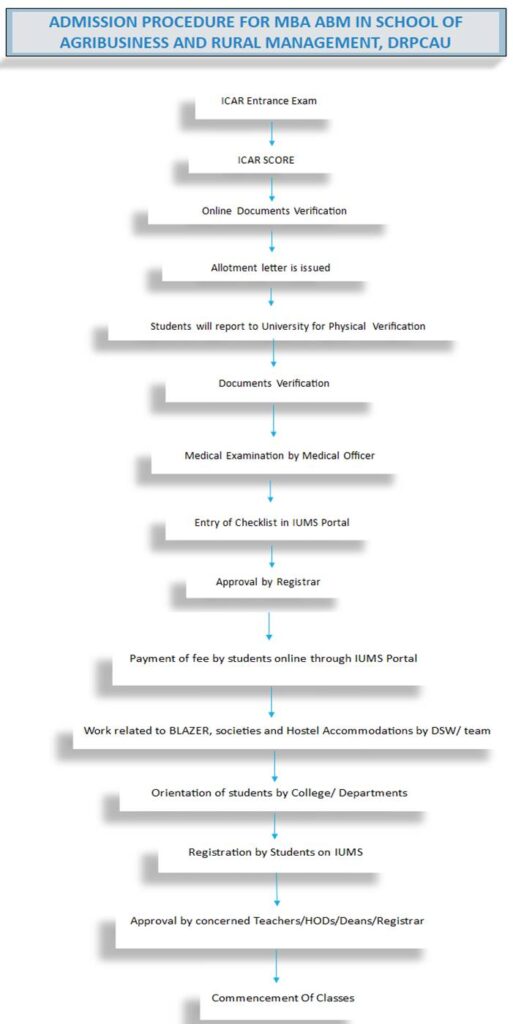
Vision, Mission and Objectives of the RM Programme
Vision
To Develop Human Resources in Rural Management for Transforming Rural India
Mission
To develop a continuous stream of professional rural managers by imparting innovative and holistic management education and skills, promoting knowledge creation and entrepreneurship development in rural areas.
Objectives
- Creating professionally trained rural managers with an appropriate ethos and values;
- Developing attitudes and skill sets in students to work on problems of rural areas in an effective manner;
- Encourage students towards rural entrepreneurship.
- Capacity building in public policy for rural transformation.
Core Values
The programme intends to promote development of core values namely, innovation, empathy, sustainability and service to rural community.
Classroom and Experiential Learning Components (Project Work / Internship)
In the first week after admission, it is ideal to organise an induction programme as a part of the academic calendar to sensitise and build the confidence levels of the admitted students. The induction program will cover the below indicated aspects:
- Sensitisation on the education, research and extension mandates of RPCAU
- Overview of activities of School of Agribusiness at RPCAU and MBA (RM) programme in particular.
- Expectations of students and faculty mentorship.
- Inaugural address by a reputed rural management/ development/ policy professional.
- Simulation games depicting rural ecosystem
- Village visit and experience sharing by the students.
- Confidence building among students and
- Career opportunities.
Details of Induction Program
| Date | Action | |||
|---|---|---|---|---|
| 1st Day | Students – teacher (internal) Introduction and interaction | |||
| 2nd Day | University Visit | |||
| 3rd Day | Visit to village- interaction with Rural Institution | |||
| 4th Day | Visit to village – interaction with Rural Community | |||
| 5th Day | Visit to village –identification of rural problems and opportunities | |||
| 6th Day | Visit to village – Students’ activities | |||
| 7th Day | Presentation by students | |||
Keeping in view the accreditation process followed in Agricultural Universities in general and RPCAU in particular, it was felt necessary to follow the broad structure approved by the ICAR for all PG programs in the agricultural Universities. It should be noted that the ICAR guidelines stipulates only the minimum with a vast scope for the Universities to enhance their curriculum based on the market demand. Project work/ Internship assessment will be jointly undertaken by the University and the Institution/s where the students are placed for the purpose of project work on the basis of 50:50 weightage.
As per the ICAR guidelines, the minimum credit hours prescribed for a PG Programme is 70 credits spread over four semesters. The details of the course structure are as under:
| Particulars | Credit Hrs for PG Programme | |||
|---|---|---|---|---|
| i. Course work | ||||
| Major Courses | 20 | |||
| Minor Courses | 08 | |||
| Supporting Courses | 06 | |||
| Common Courses | 05 | |||
| Seminar | 01 | |||
| ii. Thesis / Project work/ Internship | 30 (including 10 Credits for report writing) | |||
| Total | 70 | |||
Note:
- Major courses are related to RM
- Minor courses comprise of core Management subjects.
- Supporting courses are related to courses that are necessary for building student’s overall competence like quantitative techniques.
- Common courses as prescribed by ICAR
One credit course refers to a session of one hour per week for theory and two hours in case of practical spread over the Semester of about 20 weeks. This means that about 20- sessions of a one credit course are scheduled in a Semester. Each course of 1 credit in ICAR system is equivalent to 2 credits in AICTE system in terms of class duration hours.
The curriculum for Rural Management has been divided into two components:
- Classroom Component
- Experiential learning component (Internship/ Project Work)
Classroom component: Focus is on imparting theoretical and methodological foundations/ aspects for preparing rural managers. These courses will focus on the current and future requirements of the rural sector. A combination of core, electives and compulsory courses has been suggested considering their relevance and compliance with ICAR guidelines. Electives have to be chosen from a list of courses offered during the year relating to Rural Finance, Rural Natural Resource Management, Rural Marketing, Rural Livelihoods, Rural Project Management, Rural Policy and Sustainable Rural Development, Analytics for Rural Managers, Rural Financial Systems and Microfinance, Risk Management: Insurance and Commodity Derivatives, Gender Equity and Empowerment.
A minimum of 5% weightage should be allocated for class room participation/ attendance on a pro rata basis. A minimum of 75% attendance is mandatory for class room component failing which the students shall repeat the same course when offered again or substitute the course as approved by Head of the school. Case study and simulation-based learning is highly promoted here.
- Experiential learning component: Project Work / Internship: This component is aimed at providing the students an opportunity to understand, learn and implement theory and practices of rural management in the real rural setting/ environment. This is seen as an experiential learning opportunity for the students to test the best practices and models learnt in the class and critically examine how these theories are relevant in the rural situations. Students are expected to work on chosen projects guided by a faculty member in association with rural business organisations and development-oriented institutions. Three experiential learning modules in the form of Internship / Project Work have been included as a part of the programme. The duration of each Internship / Project Work shall be 6-10 weeks spread over during 2nd, 3rd and 4th Before undertaking experiential learning components, there should be a mandatory briefing session wherein students should be told to use this opportunity for personality development in addition to fulfilling academic expectations of the component.
Awarding PG Diploma: The University may provide in its academic regulation a provision for awarding a Diploma in Rural Management for the students admitted for MBA (RM) after the completion of one year with a minimum of 39 credits (i.e., total credit hours for Semester 1 & 2), if the student is not able to pursue the program during the second year due to valid reasons as approved by the University.
Brief history of the Agri-Business Programme
During 2006, there were several attempts to reform the functioning of the APMCs across the country due to the excessive politicization. At the same time, the Government of Bihar had abolished the APMC Act. A need was felt to transform agriculture into a business activity, professionalize management and use of modern technologies in the areas such as agriculture production, post-harvest management, promotion of value added agri products, supply chain management, marketing etc. Under this background, the University launched MBA (Agribusiness) degree programme in 2006 to develop agribusiness managers, promote entrepreneurship and undertake research with the approval of Govt. of Bihar vide letter No. 4/Secrt-20/06-2612/Agri, Patna dated 5th July 2006.
The said two-year programme is duly approved by ICAR since 2010. It is fully residential and spanned over four semesters. Since inception, the MBA (Agribusiness) programme was part of the Faculty of Basic Science and Humanities (FBS&H). With the introduction of MBA (Rural Management), the delinking of MBA (Agribusiness) programme from the FBS&H was conducted and created a separate college entitled ‘School of Agribusiness and Rural Management (SAB&RM)’ with effect from the Academic Year 2018. Presently, the intake capacity of MBA (Agribusiness) programme is 51. This programme is accredited by Indian Council of Agricultural Research, New Delhi.
Aims and Objectives
The Master of Business Administration (Agri Business) is a two-year full time residential post-Graduate degree programme which aims at generating professionally competent and socially responsible and technically qualified human capital with core management competencies having mission of becoming entrepreneurs and developing the capacity of managing agribusiness enterprise.
Highlights
Since its inception of the MBA (Agribusiness) Programme has contributed significantly for the development of quality human resources which can be evidenced in the form of Post Graduate students, secured employment in various state governments, Central Institutes, banking sector, premier agricultural Input and output industries and related sector MNCs. A few have opted the career path of entrepreneurs. Placement cell of the college is facilitating carrier guidance and personality development programmes that aim at increasing employability of the students. Faculties are also encouraging students to appear for various competitive exams.
Semester Wise Course Offered By MBA (Agribusiness)
| 1st Semester | ||||
| Course No | Course Title | Credit Hrs. | ||
|---|---|---|---|---|
| ABM – 501 | Principles of Management and Organizational Behavior | 3+0 | ||
| ABM – 502 | Managerial Accounting and Control | 3+0 | ||
| ABM – 503 | Applied Agribusiness Economics | 2+0 | ||
| ABM – 506 | Agricultural and Food Marketing Management-I | 2+0 | ||
| ABM – 539 | Communication for Management and Agri Business | 3+0 | ||
| ABM – 540 | Research Methodology for Agri Business Mgmt | 3+0 | ||
| ABM – 541 | Computer Applications for Agri Business | 3+0 | ||
Total :- | 19+0 (19) | |||
| Compulsory Non-Credit Courses | ||||
| PGS – 503 | Intellectual Property and its Management in Agriculture | 1+0 | ||
| Total:- | 1+0 (1) | |||
| Total:- | 19+1 (20) | |||
| Optional Language Courses (Non-Credit Course) | ||||
| BLG – 501 (NC) | German Language Paper-I | 0+1 | ||
| BLF – 501 (NC) | French Language Pager-I | 0+1 | ||
| 2nd Semester | ||||
| Course No | Course Title | Credit Hrs. | ||
|---|---|---|---|---|
| ABM – 504 | Human resource Management | 2+0 | ||
| ABM – 505 | Production and operations Management | 2+0 | ||
| ABM – 507 | Agricultural and Food Marketing Management-II | 2+0 | ||
| ABM – 538 | Financial Management in Agri Business | 2+0 | ||
| ABM – 543 | Agribusiness Environment & Policy | 2+0 | ||
| ABM – 595 | Summer Training/ Industrial Attachment | 4+0 | ||
| ABM – 519 | Management of Agricultural Input Marketing | 2+0 | ||
| ABM – 526 | Business Analytics for Agriculture | 2+0 | ||
Total :- | 18+0 (18) | |||
| Compulsory Non-Credit Courses | ||||
| PGS – 504 | Basic Concepts in Laboratory Techniques | 0+1 | ||
| PGS – 505 | Agricultural Research, Research Ethics and Rural Development Programmes | 1+0 | ||
| Total:- | 1+1 (2) | |||
| Total:- | 18+2 (20) | |||
| 3rd Semester | ||||
| Course No | Course Title | Credit Hrs. | ||
|---|---|---|---|---|
| ABM – 508 | Agri Supply Chain Management | 2+0 | ||
| ABM – 509 | International Trade for Agricultural Products | 2+0 | ||
| ABM – 536 | Strategic Management for Agri Business Enterprises | 2+0 | ||
| ABM – 537 | Operations Research | 2+0 | ||
| ABM – 542 | Project Management and Agri Business Entrepreneurship | 3+0 | ||
| ABM -544 | Agri Business Laws and Ethics | 2+0 | ||
| ABM – 591 | Master’s Seminar | 0+1 | ||
| ABM – 525 | Management of Agri-Business Co-Operatives | 2+0 | ||
| ABM -531 | Advertising And Brand Management | 1+0 | ||
| ABM – 535 | Agri Commodity Markets And Futures Trading | 1+0 | ||
Total :- | 17+1 (18) | |||
| Compulsory Non-Credit Courses | ||||
| PGS – 501 | Library and Information services | 0+1 | ||
| PGS-502 | Technical Writhing and Communications skills | 0+1 | ||
| Total:- | 0+2 (2) | |||
| Total:- | 18+2 (20) | |||
| Optional Language Courses (Non-Credit Course) | ||||
| BLG – 501 (NC) | German Language Paper-I | 0+1 | ||
| BLF – 501 (NC) | French Language Pager-I | 0+1 | ||
| 4th Semester | ||||
| Course No | Course Title | Credit Hrs. | ||
|---|---|---|---|---|
| ABM – 599 | Project Work | 0+10 | ||
Total :- | 0+10 (10) | |||
Semester Wise Course Offered By MBA (Rural Management)
| 1st Semester | ||||
| Course No | Course Title | Credit Hrs. | ||
|---|---|---|---|---|
| MRM – 501 | Indian Rural Society and Rural Administration | 2+0 | ||
| MRM – 526 | Managerial Economics | 2+0 | ||
| MRM – 502 | Accounting for Rural Management | 1+1 | ||
| MRM – 503 | Rural Innovations & Creativity | 2+0 | ||
| MRM – 504 | Rural Entrepreneurship and Micro Enterprises | 1+1 | ||
| MRM – 530 | Business Analytics | 0+1 | ||
| MRM – 531 | Rural Research Methods | 2+0 | ||
| MRM – 527 | Individual and Organizational Behaviour | 2+0 | ||
Total :- | 12+3 (15) | |||
| Compulsory Non-Credit Courses | ||||
| PGS – 502 | Technical Writing and Communications skills | 0+1 | ||
| PGS – 505 | Agricultural Research, Research Ethics and Rural Development Programmes | 1+0 | ||
| PGS – 501 | Library and Information services | 0+1 | ||
| Total:- | 1+2 (3) | |||
| Total:- | 15+3 (18) | |||
| Optional Language Courses (Non-Credit Course) | ||||
| BLG – 501 (NC) | German Language Paper-I | 0+1 | ||
| BLF – 501 (NC) | French Language Pager-I | 0+1 | ||
| 2nd Semester | ||||
| Course No | Course Title | Credit Hrs. | ||
|---|---|---|---|---|
| MRM – 532 | Operations Management | 1+1 | ||
| MRM – 506 | Financial Management for Rural Managers | 1+1 | ||
| MRM – 507 | Marketing Management for Rural Organizations | 2+0 | ||
| MRM – 505 | Management of Cooperatives and Collectives | 2+0 | ||
| MRM – 528 | Human Resource Management and Organizational Development | 2+0 | ||
| MRM – 591 | Seminar | 0+1 | ||
| MRM – 597 | Field Internship | 0+10 | ||
Total :- | 8+13 (21) | |||
| Compulsory Non-Credit Courses | ||||
| PGS – 504 | Basic Concepts in Laboratory Techniques | 0+1 | ||
| Total:- | 0+1 (1) | |||
| Total:- | 21+1 (22) | |||
| 3rd Semester | ||||
| Course No | Course Title | Credit Hrs. | ||
|---|---|---|---|---|
| MRM – 529 | Strategic Management | 2+0 | ||
| MRM – 508 | Civil Society and NGO Management, Corporate social Responsibility | 1+0 | ||
| MRM – 509 | Development advocacy and Communication | 2+0 | ||
| MRM – 516 | Big-Data and Business Intelligence | 1+0 | ||
| MRM – 521 | Behavioural Economics | 1+0 | ||
| MRM -598 | Summer Internship | 0+10 | ||
Total :- | 7+10 (17) | |||
| Compulsory Non-Credit Courses | ||||
| PGS – 503 | Intellectual Property and its Management in Agriculture | 0+1 | ||
| Total:- | 0+1 (1) | |||
| Total:- | 17+1 (18) | |||
| Optional Language Courses (Non-Credit Course) | ||||
| BLG – 501 (NC) | German Language Paper-I | 0+1 | ||
| BLF – 501 (NC) | French Language Pager-I | 0+1 | ||
| 4th Semester | ||||
| Course No | Course Title | Credit Hrs. | ||
|---|---|---|---|---|
| MRM – 533 | Information, Communication, Technology (ICT) and MIS | 1+1 | ||
| MRM-510 | Rural Project Management | 2+0 | ||
| MRM-512 | Rural Banking and Micro-Finance | 1+0 | ||
| MRM-514 | Monitoring and Evaluation of Developmental Projects | 1+0 | ||
| MRM-517 | Supply Chain Management | 1+0 | ||
| MRM-599 | Project Work | 0+10 | ||
Total :- | 6+11 (17) | |||
Life at SAB&RM
Student Development Activities
For the practical exposure, engagement and development of students, different students’ clubs were formed to discuss, deliberate, debate, conduct management games, and organization of guest lecturers from the subject matter specialists/ experts in the area concerned. All these clubs are handled by the students only under the faculty mentorship. The active club includes the following:
- Social Media and PR Club
- Agribusiness and Rural Management Club
- Entrepreneurship & Innovation Club
- Placement Committee
- Academic Committee
- Training and Consultancy
- Sports and Cultural Committee
- School Welfare Committee
- Gender Champions and CSR Club
Personality Development Initiatives
- Soft Skill Training
- Mock GDs and PIs are conducted by specialized faculty.
- Seminars/E-varta/ Leadership talks addressed by the outside experts help in development of students’ interpersonal and soft skills.
Regular feedback mechanism from industry stalwarts on the requirement of sector specific skill sets.
Co-curricular and Extracurricular Activities: Life @ SAB&RM
Celebrating major festive like Saraswati Pooja, Ganesh Pooja among others.
- Participation by the students in Kisan Mela and dialogue exchange with the farming community
- Student participation Sport meet at the university
- Regular engagement in the university level events such as Hindi Pakhwada
- Student engagement in national level management events such as B plan, B quiz etc.
SABRM Chronicle
| Sr. No. | Name | Position | Contact No. | |
|---|---|---|---|---|
| 1 | Dr. Ram Datt | Associate Professor and Co-ordinator | 8210063779 | ramdatt@rpcau.ac.in |
| 2 | Dr. Ritambhara Singh | Associate Professor | 9537923502 | ritambharasingh@rpcau.ac.in |
| 3 | Dr. S K Sameer | Associate Professor | 8800098813 | sksameer@rpcau.ac.in |
| 4 | Dr. Raj Shravanthi Andukuri | Assistant Professor | 8248430540 | rajsharavanthi@rpcau.ac.in |
| 5 | Ms. Rashmi Sinha | Assistant Professor | 9934384817 | rashmi.sinha@rpcau.ac.in |
| 6 | Dr. Mohit Sharma | Assistant Professor | 9549034035 | mohit.sharma@rpcau.ac.in |
| 7 | Dr. Shiva Pujan Singh | Assistant Professor | 6202726063 | spsingh.sri@rpcau.ac.in |
